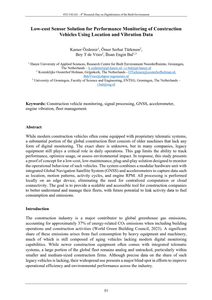While modern construction vehicles often come equipped with proprietary telematic systems, a substantial portion of the global construction fleet consists of older machines that lack any form of digital monitoring. The exact share is unknown, but in many companies, legacy equipment still plays a critical role in daily operations. This gap limits the ability to track performance, optimize usage, or assess environmental impact. In response, this study presents a proof of concept for a low-cost, low-maintenance, plug-and-play solution designed to monitor the operational behaviour of such vehicles. The system combines a modular hardware unit with integrated Global Navigation Satellite System (GNSS) and accelerometers to capture data such as location, motion patterns, activity cycles, and engine RPM. All processing is performed locally on an edge device, eliminating the need for centralized computation or cloud connectivity. The goal is to provide a scalable and accessible tool for construction companies to better understand and manage their fleets, with future potential to link activity data to fuel consumption and emissions.
DOCUMENT

In recent years, a step change has been seen in the rate of adoption of Industry 4.0 technologies by manufacturers and industrial organizations alike. This article discusses the current state of the art in the adoption of Industry 4.0 technologies within the construction industry. Increasing complexity in onsite construction projects coupled with the need for higher productivity is leading to increased interest in the potential use of Industry 4.0 technologies. This article discusses the relevance of the following key Industry 4.0 technologies to construction: data analytics and artificial intelligence, robotics and automation, building information management, sensors and wearables, digital twin, and industrial connectivity. Industrial connectivity is a key aspect as it ensures that all Industry 4.0 technologies are interconnected allowing the full benefits to be realized. This article also presents a research agenda for the adoption of Industry 4.0 technologies within the construction sector, a three-phase use of intelligent assets from the point of manufacture up to after build, and a four-staged R&D process for the implementation of smart wearables in a digital enhanced construction site.
DOCUMENT

from the article: "Abstract The way in which construction logistics is organised has considerable impact on production flow, transportation efficiency, greenhouse gas emissions and congestion, particularly in urban areas such as city centres. In cities such as London and Amsterdam municipalities have issued new legislation and stricter conditions for vehicles to be able to access cities and city centres in particular. Considerate clients, public as well private, have started developing tender policies to encourage contractors to reduce the environmental impact of construction projects. This paper reports on an ongoing research project applying and assessing developments in the field of construction logistics in the Netherlands. The cases include contractors and third party logistics providers applying consolidation centres and dedicated software solutions to increase transportation efficiency. The case show various results of JIT logistics management applied to urban construction projects leading to higher transportation efficiencies, and reduced environmental impact and increased production efficiency on site. The data collections included to-site en on-site observations, measurement and interviews. The research has shown considerable reductions of vehicles to deliver goods and to transport workers to site. In addition the research has shown increased production flow and less waste such as inventory, waiting and unnecessary motion on site."
DOCUMENT
